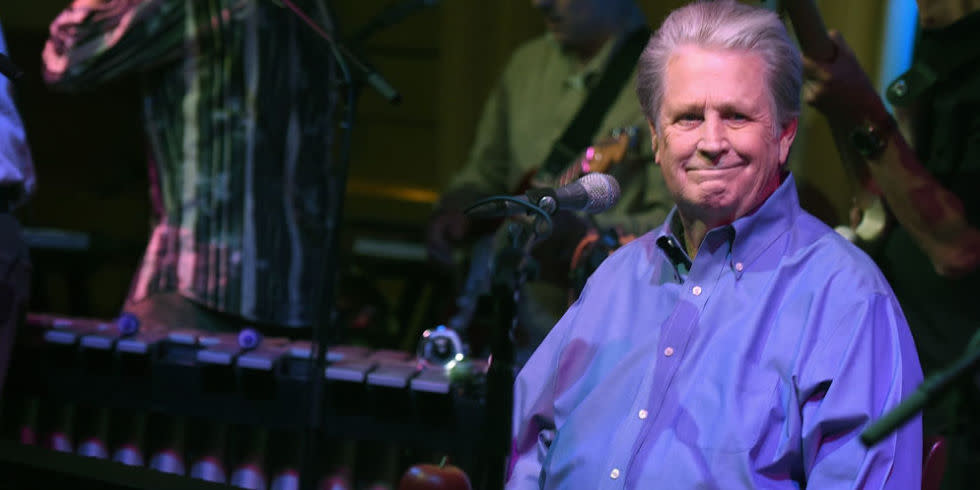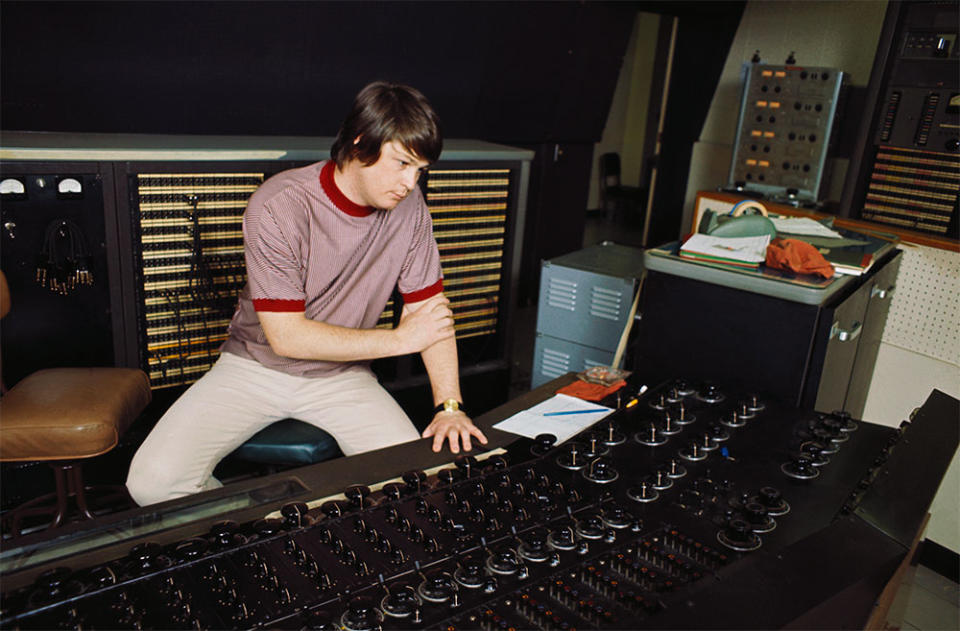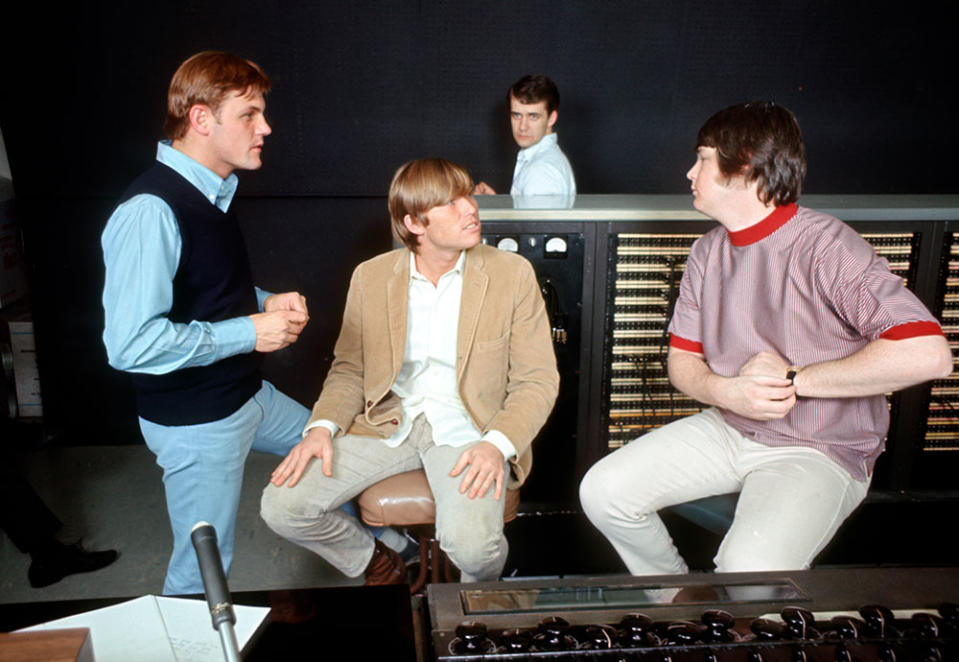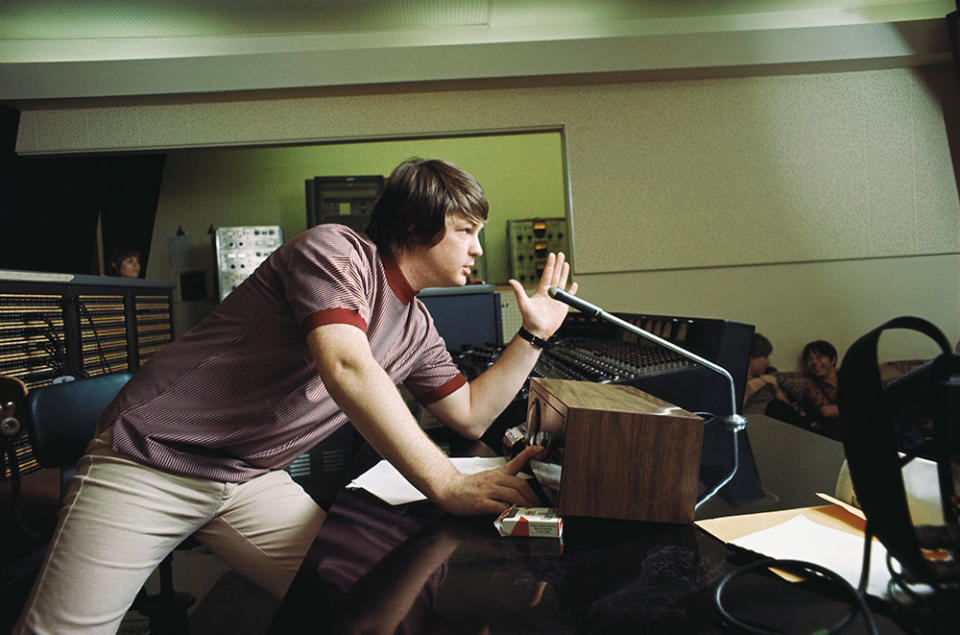Brian Wilson Remembers 'Pet Sounds' on the Album's 50th Anniversary

"It's great to have someone who can keep you laughing when you're working hard in the studio, and I remember Mike was really funny when we were working on Pet Sounds," Brian Wilson tells me of his former Beach Boys band mate, and sometime nemesis, Mike Love. "I try to forget the bad stuff. Mostly, we had a lot of fun in the studio. I remember Al Jardine had to stand on a little block, because he was kind of short, when we all stood around the microphone, and that Mike kept making jokes, making us laugh. Those were really great times."
Pet Sounds turns 50 today, and it will get another deluxe reissue on June 10th in celebration of that milestone. But Wilson says he never tires of talking about his most famous creation-and the Beach Boys' artistic peak-though he still prefers the original monophonic version.
"I do listen to it, yeah," says Wilson, who, remarkably, is largely deaf in one ear. "I think the stereo and surround mixes, and all the outtakes, are really good and very well done, but I do prefer the original mono version, because of my hearing."

The Beach Boys' 1966 album has been transformed into one of popular music's most important recordings in the past 25 years after a rocky start, considering it was released by one of the premiere bands of the 1960s at the height of their fame. A strident departure from the themes of fun, sun, cars, and girls of the Beach Boys' early hits, the group's 11th studio album was met largely with indifference upon its release-especially in America-but has since found itself atop countless critic and fan polls. Pet Sounds, which was inducted into the Grammy Hall of Fame in 1998, is now one of popular music's most-cited influences, and critics regularly hail it as one of the greatest albums ever recorded. It recently topped MOJO magazine's Greatest Albums of All Time, and Rolling Stone ranked it Number Two in its list of the 500 Greatest Albums of All Time. But those accolades were a long time coming.
It really did belong in another time, I think-as Brian would tell us in the song, "I Just Wasn't Made for These Times."
"Maybe because it wasn't successful-or as successful-it's had a longer life," says Al Jardine, who is currently on tour with Brian Wilson, playing Pet Sounds in its entirety. "It still sounds modern, even though it's now 50 years old. It really did belong in another time, I think-as Brian would tell us in the song, 'I Just Wasn't Made for These Times.'"
"Pet Sounds simultaneously ended the Beach Boys' career as a pop band beloved by teens and kick started Brian Wilson's mythologized legacy as a studio guru to be adored by serious music fans," author Pat Thomas says. "They did so much with those 35 minutes. For instance, almost by accident-and totally unlike the rest of the album-they made a significant contribution to the folk-rock canon when they wove their magic on the song 'Sloop John B', when for a moment they sounded like fellow Los Angeles wizards the Byrds."
"I arranged the guitars on 'Sloop John B' so they'd sound real sparkly, and real nice," Wilson recalls. "Al Jardine came over to my house and asked me if I'd arrange it. He played the song to me and I learned the song, and then I did the arrangement for it, and he did the vocals. He still sings it today, and it still sounds great and really fresh."
"I think we were working on 'California Girls' at the time," Jardine recalls of the genesis of one of the first songs recorded for Pet Sounds. "I really had to strategize, because I felt strongly about the song, but I'm a guitar player who taught myself a little piano. So I had limited resources with which to get the song across to Brian, who is a keyboard guy, of course. I took this little three-chord folk song that had a great melody, I thought, and tried to give it a Beach Boys vibe by adding a minor chord. It really helped open up the possibilities, and Brian heard that right away." But the breadth and depth of the vocal arrangement that he came up with took it to a whole other level. His production of this really simple idea that I presented him was just a masterpiece."
While it pointed a way forward for Wilson, Jardine says there are plenty who don't feel "Sloop John B." belongs on Pet Sounds.
"Paul McCartney has always said he doesn't like it and doesn't feel like it belongs on the album," Jardine says with a shrug. "And maybe it doesn't belong on Pet Sounds thematically. But from a production point of view, it's just a masterpiece of work. And you also need that relief, and it provided that. Even now, when we play 'Sloop John B' live, I get a standing ovation. Of course, right after that, Brian does 'God Only Knows' and he gets a bigger ovation."
"God Only Knows" is perhaps Wilson's greatest song, with everyone from Elvis Costello to Paul McCartney citing it as a masterpiece. But it came easily, Wilson says, and he insists he had no problem handing the lead vocal duties of the peerless creation to his brother, Carl Wilson. "I remember him asking me, kind of surprised, 'Do you really want me to sing this one?'" he remembers. "And I said, 'Yeah! I would love for you to sing it.' People always wonder why I didn't sing it, but I always had Carl in mind. I just thought he'd be good for the song. And I wanted to give him a chance to really sing!"
"'God Only Knows' was a massive hit in the U.K.," music journalist Jon Savage says. "And 'Sloop John B' was a massive hit, too. And then 'Good Vibrations' was Number One in the fall. But where they did do badly, comparatively, was in the U.S. Pet Sounds was considered a flop at the time, especially by the Beach Boys' label. But it was another one of those records where its influence and reputation has grown and grown over the years."
"The group did not have as many hits in England as they'd had in America, so when Pet Sounds came out, it defined what the Beach Boys were capable of, without judgment, for the U.K. audience," Beach Boys biographer Domenic Priore says in agreement. "It had a tremendous effect not only on the Beatles, but the entire European pop music scene in a way that only slightly happened in America."
"I'm really grateful for the fans in England, yeah," Wilson says of the hits Pet Sounds spawned there. "But it was a hard time when it didn't do as well as I'd hoped."

"It seemed like just this non-stop hit machine at the time," Jardine recalls. "We were we a hit machine called the Beach Boys, and the Beach Boys didn't record 'serious music.' We were really just a bunch of southern California dudes who happened to sing pretty well. We didn't have an audience for the kind of music Brian was doing. That audience had to develop and come appreciate what incredible music was underlying all of that excitement that we were generating. Besides, when Pet Sounds wasn't getting any kind of reception from our fans." Capitol Records wasn't particularly supportive of the Beach Boys' envelope-pushing sound, either. "Our label immediately put out The Best of the Beach Boys," Jardine says, "so Pet Sounds was pretty quickly put on the back burner and never heard from again until about 30 years later when there a new appreciation for it started to develop."
For Wilson, the technological hurdles were what he recalls most about the making of the album, and he says the very technical limitations he faced may have even helped him in his quest to outdo the Beatles. "I didn't use Pro Tools back then, because we didn't have Pro Tools," Wilson says of the digital recording system that allows endless takes and tweaks unimaginable in 1966. "But I managed to get the album produced on just a four-track machine. I think in some ways having to make decisions right away about arrangements and which takes to use inspired me very much, though."

And it wasn't just his rivalry with the Beatles that pushed Wilson to the heights he reached on Pet Sounds. "A lot of Phil Spector's records inspired me," Wilson admits. "They were really fantastic records. I especially liked his drums and his use of echo." Beach Boys biographer Priore reiterates Spector's influence on the album. "The very first time I had the opportunity to have a casual conversation with Brian Wilson, it wound up being about how Phil Spector went more for cacophony, to create effect," he says. "With Pet Sounds, Brian [was trying] to create aural space in sound with the same kind of grandiose power as Spector, but with more breathing room and, ultimately, romance."
"The Beach Boys' fame for vocal arrangement is one thing, but I think Brian goes far beyond the vocal thing of the Beach Boys with his instrumental arrangements on Pet Sounds," Priore says. "Musical instruments have more dynamic range than the human voice, so even on 'Caroline, No,' perhaps Brian's best vocal of all time, it is swept away by the accompanying instrumental textures."
Wilson, perhaps surprisingly, agrees. "'Caroline, No' is a cool song. That's one of my favorites on the album," he admits. "I knew I wanted it to be the last song on the album; that was my idea to do that. And I never had any ideas about any of the other Beach Boys singing it. But my favorites are 'Wouldn't It Be Nice' and the two instrumentals, 'Pet Sounds' and 'Let's Go Away for Awhile'. I love them because, whenever I hear them, it's a chance for me to really hear my studio arrangements."
So, after all this time, is there anything the famously perfectionist Wilson would change, or anything that he feels he didn't get quite right? "No, actually I wouldn't," Wilson says, seeming almost surprised at his answer.
Then he ends our interview on a more assured note: "No, there's nothing I wish I had done better."

